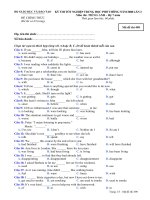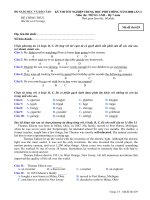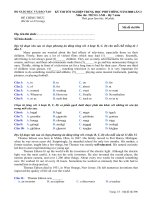Đề thi tiếng anh tham khảo 2
Bạn đang xem bản rút gọn của tài liệu. Xem và tải ngay bản đầy đủ của tài liệu tại đây (118.28 KB, 9 trang )
ĐỀ THI THỬ TUYỂN SINH ĐẠI HỌC, CAO ĐẲNG
NĂM HỌC 2010-2011
(Thời gian làm bài: 90 phút)
Mark the letter A, B, C, or D on your answer sheet to indicate the word that differs from
the rest in the position of the main stress in each of the following questions.
Question 1: A. familiar B. impatient C. uncertain D. arrogant
Question 2: A. forgettable B. philosophy C. humanism D. objectively
Question 3: A. disappear B. arrangement C. opponent D. contractual
Question 4: A. respectable B. affectionate C. occasional D.kindergarten
Question 5: A. environmental B. conservatively C. approximately D. considerable
Mark the letter A, B, C, or D on your answer sheet to indicate the correct answer to each
of the following questions.
Question 6: Research has shown that there is no difference at all between the brain of the
average woman and _______of the average man.
A. what B. which C. one D. that
Question 7: "MD" is the abbreviation of _______.
A. Medical Development B. Doctor of Medicine
C. Medium Density D. Management Director
Question 8: -'- "That's a very nice skirt you're wearing."
-“ ___________”
A. How a compliment! B. That's all right.
C. It's nice of you to say so. D. I like you said so.
Question 9: _______are the formal rules of correct or polite behavior among people using
the Internet.
A. Traffic rules B. Family rules
C. Codes of etiquettes D. Codes of netiquettes
Question 10: -" ____________"
- "Yes, of course."
A. You won't help me this time
B. You'd better give me one hand.
C. I don't think I'll need your help.
D. Could you give me a hand?
Question 11: UNICEF _______supports and funds for the most disadvantaged children all
over the world.
A. presents B. assists C. provides D. offers .
Question 12: Is there anyone who _______ the plan put forward by the committee?
A. differs B. disagrees C. objects D. opposes
Question 13: He would win the race if he _______his brother's example and trained harder.
A. repeated B. set C. answered D. followed
Question 14 "Excuse me. Where is the ____________office of OXFAM located?"
A. leading B. head C. central D. summit
Question 15: She neglected her study during the term, _______she couldn't pass the exam.
A. although B. because C. so that D. so
Question 16: The doctors know that it is very difficult to save the patient's life,
_______they will try their best.
A. but B. although C. despite D. however
Question 17: I am sending you my curriculum vitae _______you will have a chance to
study it before our interview.
A. so that B. because C. for D. since
Question 18: Unfortunately, your letter arrived after the final date for application.
_______, we cannot consider you for the post.
A. As result B. That is because C. Consequently D. To this
Question 19: Everybody in the house woke up when the burglar alarm ______
A. went out B. went off C. came about D. rang off
Question 20: - " You're already leaving? The ball is only starting."
- " But it's very late, so _______."
A. take care B. have a good day C. goodbye for now D. it's great
fun, thanks^
Question 21: Have a piece of chocolate,_ ______?
A. do you B. would you C. don't you D. haven't you
Question 22: By the time you come here tomorrow, the work _______.
A. will have been finishing B. will be finishing
C. will have been finished D. will be finished
Question 23: If you put your money in a bank now, you may get 12% _______annually.
A. interest B. profit C. money D. income
Question 24: -" _______"
- "Yes. I'd like to buy a computer."
A. Do you look for something? B. Good morning. Can I help you?
C. Excuse me. Do you want to buy it?D. Can you help me buy something?
Question 25: In making remarks, he _______to understatement.
A. declined B. intended C. aligned D. inclined
Question 26: After her illness, Lam had to work hard to _______ his classmates.
A. catch sight of B. keep pace with
C. get in touch with D. make allowance for
Question 27: Some kinds of birds are on the _______of extinction.
A. brink B.tip C. side D. edge
Question 28: _______of popular expressions in our language have interesting backgrounds.
A. A large number B. The large number C. A great deal D. A sum
Question 29:_______for farming purposes, soil must contain the minerals plants require.
A. To be good B. Being good C. Be good D. That's good
Question 30: Please _______your cigarette. I am going to get choked.
A. cut down B. blowout C. put aside D. put out
Question 31: The new laws have encouraged both domestic and foreign private _______.
A. savings B. paying C. investment D. economics
Question 32: Since the reform, the country has undergone _______changes.
A. large B. sizeable C. substantial D. favourable
Question 33: _ “ Do you like your new job?"
- "Yes, but my employer insisted that I _______on time."
A. was B. am C. have been D. be
Question 34: Many companies know that attractive ____________can persuade customers
to buy their goods.
A. packs B. packets C. package D. packaging
Question 35: I think the company should inform its customers _______the improvements
in their services.
A. on B. about C. to D. with
Read the following passage and mark the letter A, B, C, or D on your answer sheet to
indicate the correct answer for each of the blanks from 36 to 45.
The universal symbol of the Internet era communications, the @ sign used in e-mail
addresses to signify the word 'at', is (36)___ a 500-year-old invention of Italian merchants,
a Rome academic has revealed. Giorgio Stabile, a science professor at La Sapienza
University, (37)_to have stumbled on the earliest known example of the symbol's use, as
a(n) (38) __ of a measure of weight or volume. He says the sign represents an amphora, a
measure of (39) _ based on the terracotta jars used to transport grain and liquid in the
ancient Mediterranean world.
The professor (40)_toe ancient symbol in the course of research for a visual history
of the 20
th
century, to be published by the Treccani Encyclopedia. The first (41)_instance of
its use, he says, occurred in a letter written by a Florentine merchant on May 4, 1536. He
says the sign made its (42) _ along trade routes to northern Europe, where it came to
represent 'at the price of, its contemporary accountancy (43)_.
Professor Stabile believes that Italian banks may possess even earlier documents
(44)_the symbol lying forgotten in their archives. The oldest example could be of great
value. It could be used (45) _ publicity purposes and to enhance the prestige of the
institution that owned it,* he says. The race is on between the mercantile world and the
banking world to see who has the oldest documentation of @.
Question 36: A. actually B. truly C. essentially D. accurately
Question 37: A. says B. states C. claims D. tells
Question 38: A. proof B. sign C. evidence D. indication
Question 39: A. ability B. capacity C. capability D. facility
Question 40: A. exposed B. unearthed C. dug D. devised
Question 41: A. known B. knowing C. knowable D. knowledgeable
Question 42: A. line B. means C. way D. method
Question 43: A sense B. importance C. meaning D. understanding
Question 44: A. taking B. carrying C. delivering D. bearing
Question 45: A. on B. for C. with D. by
Read the following passage and mark the letter A, B, C, or D on your answer sheet to
indicate the correct answer to each of the questions from 46 to 55.
A rather surprising geographical feature of Antarctica is that a huge freshwater
lake, one of the world's largest and deepest, lies hidden there under four kilometers of ice.
Now known as Lake Vostok, this huge body of water is located under the ice block that
comprises Antarctica. The lake is able to exist in its unfrozen state beneath this block of ice
because its waters are warmed by geothermal heat from the earth's core. The thick glacier
above Lake Vostok actually insulates it from the frigid temperatures on the surface.
The lake was first discovered in the 1970s while a research team was conducting an
aerial survey of the area. Radio waves from the survey equipment penetrated the ice and
revealed a body of water of indeterminate size. It was not until much more recently that
data collected by satellite made scientists aware of the tremendous size of the lake; the
satellite-borne radar detected an extremely flat region where the ice remains level because
it is floating on the water of the lake.
The discovery of such a huge freshwater lake trapped under Antarctica is of interest
to the scientific community because of the potential that the lake contains ancient microbes
that have survived for thousands upon thousands of years, unaffected by factors such as
nuclear fallout and elevated ultraviolet light that have affected organisms in more exposed
areas. The downside of the discovery, however, lies in the difficulty of conducting research
on the lake in such a harsh climate and in the problems associated with obtaining
uncontaminated samples from the lake without actually exposing the lake to contamination.
Scientists are looking for possible ways to accomplish this.
Question 46: The word "hidden" in paragraph 1 is closest in meaning to
A. undrinkable B. untouched C. unexploitable
D. undiscovered
Question 47: What is true of Lake Vostok?
A. It is completely frozen. B. It is a saltwater lake.
C. It is beneath a thick slab of ice. D. It is heated by the sun.
Question 48: Which of the following is closest in meaning to "frigid" in paragraph 1?
A. Extremely cold B. Easily broken C. Quite harsh
D. Lukewarm
Question 49: A ll of the following are true about the 1970 survey of Antarctica EXCEPT
that it ______
A. was conducted by air
B. made use of radio waves
C. could not determine the lake's exact size
D. was controlled by a satellite
Question 50: It can be inferred from the passage that the ice would not be flat if _______.
A. there were no lake underneath B. the lake were not so big
C. Antarctica were not so cold D. radio waves were not used
Question 51: The word "microbes" in paragraph 3 could best be replaced by which of the
following?
A. Pieces of dust B. Tiny bubbles
C. Tiny organisms D. Rays of light
Question 52: Lake Vostok is potentially important to scientists because it
A. can be studied using radio waves
B. may contain uncontaminated microbes
C. may have elevated levels of ultraviolet light
D. has already been contaminated
Question 53: The word "downside" in paragraph 3 is closest in meaning to ______
A. bottom level B. negative aspect
C. underside D. buried section
Question 54: The last paragraph suggests that scientists should be aware of
A. further discoveries on the surface of Antarctica
B. problems with satellite-borne radar equipment
C. ways to study Lake Vostok without contaminating it
D. the harsh climate of Antarctica
Question 55: The purpose of the passage is to______
A. explain how Lake Vostok was discovered
B. provide satellite data concerning Antarctica
C. discuss future plans for Lake Vostok
D. present an unexpected aspect of Antarctica's geography
Read the following passage and mark the letter A, B, C, or D on your answer sheet to
indicate the correct answer to each of the questions from 56 to 65.
Perhaps the most striking quality of satiric literature is its freshness and its
originality of perspective. Satire itself, however, rarely offers original ideas. Instead, it
presents the familiar in a new form. Satirists do not offer the world new philosophies. What
they do is look at familiar conditions from a perspective that makes these conditions seem
foolish, harmful, or affected. Satire jars us out of complacence into a pleasantly shocked
realization that many of the values we unquestioningly accept are false.
Don Quixote makes chivalry seem absurd; Brave New World ridicules the
pretensions of science; A Modest Proposal dramatizes starvation by advocating
cannibalism. None of these ideas is original. Chivalry was suspect before Cervantes,
humanists objected to the claims of pure science before Aldous Huxley, and people were
aware of famine before Swift.
It was not the originality of the idea that made these satires popular. It was the
manner of expression, the satiric method, that made them interesting and entertaining.
Satires are read because they are aesthetically satisfying works of art, not because they are
morally wholesome or ethically instructive. They are stimulating and refreshing because
with commonsense briskness they brush away illusions and secondhand opinions. With
spontaneous irreverence, satire rearranges perspectives, scrambles familiar objects into
incongruous juxtaposition, and speaks in a personal idiom instead of abstract platitude.









